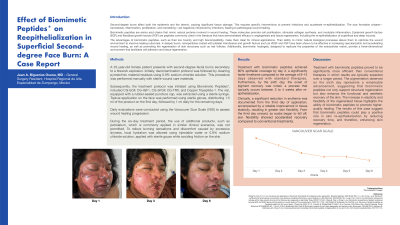Case Series/Study
(CS-016) Effect of Biomimetic Peptides* on Reepithelialization in Superficial Second-degree Face Burn: A Case Report
Friday, May 2, 2025
7:45 PM - 8:45 PM East Coast USA Time

Introduction: Second-degree burns often result in significant tissue damage, necessitating advanced therapeutic approaches to accelerate healing and reduce complications. Biomimetic peptides* have gained attention for their potential to promote reepithelialization due to their regenerative properties by imitating biological natural processes.
Methods: A 35-year-old patient with a superficial second-degree burn on the face underwent treatment with a peptide-based formulation administered topically. The treatment regimen included daily application over a 6 days period, complemented by standard wound care practices. Progress was monitored through photographic documentation and clinical evaluation of Vancouver Scar Scale.
Results: By the end of the treatment period, the burn site exhibited significant reepithelialization, with over 80% observed within 3 days. Erythema and inflammation were markedly reduced by day 6, and the patient reported minimal discomfort throughout the recovery process. Minimum adverse reactions were documented. Comparative analysis with standard care outcomes in similar cases suggested an accelerated healing timeline.
Discussion: This case underscores the potential of biomimetic peptides* in enhancing wound healing in second-degree burns. The observed rapid epithelialization suggests that these peptides may play a pivotal role in modulating cellular responses and promoting tissue regeneration. Future studies with larger cohorts are needed to validate these findings and explore the molecular mechanisms underlying these effects. These preliminary results highlight the promise of integrating biomimetic peptides into standard burn care protocols, potentially improving outcomes and reducing recovery times.
Methods: A 35-year-old patient with a superficial second-degree burn on the face underwent treatment with a peptide-based formulation administered topically. The treatment regimen included daily application over a 6 days period, complemented by standard wound care practices. Progress was monitored through photographic documentation and clinical evaluation of Vancouver Scar Scale.
Results: By the end of the treatment period, the burn site exhibited significant reepithelialization, with over 80% observed within 3 days. Erythema and inflammation were markedly reduced by day 6, and the patient reported minimal discomfort throughout the recovery process. Minimum adverse reactions were documented. Comparative analysis with standard care outcomes in similar cases suggested an accelerated healing timeline.
Discussion: This case underscores the potential of biomimetic peptides* in enhancing wound healing in second-degree burns. The observed rapid epithelialization suggests that these peptides may play a pivotal role in modulating cellular responses and promoting tissue regeneration. Future studies with larger cohorts are needed to validate these findings and explore the molecular mechanisms underlying these effects. These preliminary results highlight the promise of integrating biomimetic peptides into standard burn care protocols, potentially improving outcomes and reducing recovery times.

.jpg)